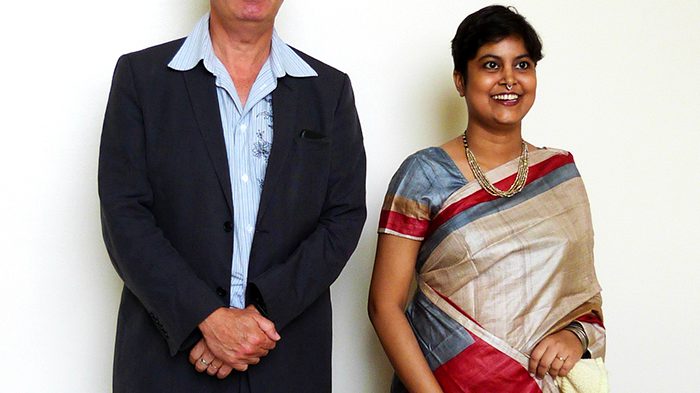« Le Haṭha Yoga : la technique du corps-esprit et la religion. Une croyance française de la lignée indienne »

« Le Haṭha Yoga : la technique du corps-esprit et la religion. Une croyance française de la lignée indienne »
21 juin 2018 Aucun commentaire sur « Le Haṭha Yoga : la technique du corps-esprit et la religion. Une croyance française de la lignée indienne »Somdatta Mukherjee, doctorante du CANTHEL, a soutenu avec succès sa thèse ce jeudi 21 juin 2018, à l’université Paris Descartes.
Thèse : « Le Haṭha Yoga : la technique du corps-esprit et la religion. Une croyance française de la lignée indienne [Haṭha Yoga: Mind-Body Technique and Religion. A French Believing of Indic Lineage]»
Directeur de thèse : Erwan Dianteill
Jury : Karl Baier (University of Vienna), Ruby Sain (Jadavpur University), Céline Béraud (EHESS) et Serena Bindi (Université Paris Descartes)
Résumé :
In her present work Somdatta is trying to showcase how the concept and practice of haṭha yoga has burgeoned as a French believing and emerged as a mind-body-technique. This showcasing has been manifested by an ethnographic experience that she had been engaged in for nine months in Paris. The ethnographic field work on Eva Ruchpaul and Dorothea Hirsch has entirely been used to fathom the tradition and transmission of haṭha yoga (as the practitioners claim it to be) in French milieu. This ethnographic study has also been maneuvered to exhibit how French believing has been thriving at the confluence of the vulgarization of haṭha yoga and advaita. To trace back the root of this French believing she has completed ethnographic field work at Ramana Maharshi Ashram, South India. How the elective fraternity of Ramana Maharshi, the haṭha yoga class-rituals at both Eva’s and Dorothea’s institute help gravitate the practice to religiosity is also a crucial focal point of her present work.
Dans son travail actuel, Somdatta tente d’exposer comment le concept et la pratique du hatha-yoga ont fleuri en tant que croyance française et sont apparus comme une technique corps-esprit. Cette mise en lumière s’est manifestée par une expérience ethnographique à laquelle elle s’est livrée pendant neuf mois à Paris. Le travail de terrain ethnographique sur Eva Ruchpaul et Dorothea Hirsch a été entièrement utilisé pour sonder la tradition et la transmission du haṭha yoga (comme les pratiquants le prétendent) dans le milieu français. Cette étude ethnographique a également été manoeuvrée pour montrer comment la croyance française a prospéré au confluent de la vulgarisation du haṭha yoga et de l’advaita. Pour retrouver la racine de cette croyance français, elle a terminé son travail ethnographique sur le terrain à Ramana Maharshi Ashram, Inde du Sud. La façon dont la fraternité élective de Ramana Maharshi, les rituels de classe de haṭha yoga à l’institut d’Eva et de Dorothea, conduisent la pratique vers la religiosité est également un point crucial de son travail actuel.
